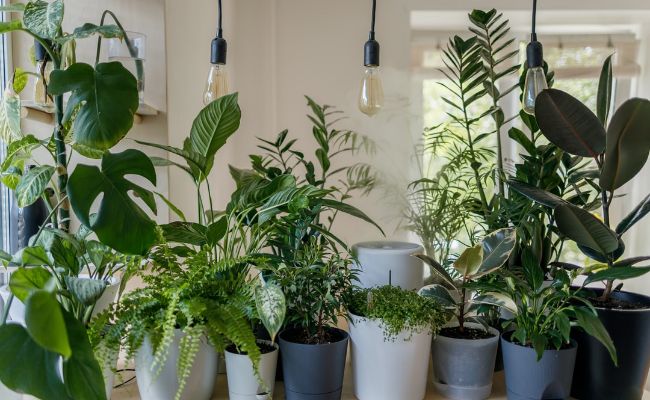Modern living can result in the air in our homes being stale and due to central heating systems and the materials used in many of the products found indoors, the air can contain pollutants and the level of moisture or humidity in the air may be less than recommended. Air becomes dry through the use of central heating systems and the vapours from some chemicals contained in paints and technology can also affect the overall air quality in the home. This can lead to the air that we breathe indoors becoming stale and resulting in issues such as headaches and coughs but something as simple as the humble hose plant can make all the difference.
Plants have been scientifically proven to increase the levels of oxygen in the air indoors and to help keep the air cleaner due to the fact that as they grow they can remove some of the chemical toxins from the air.
In advance of National Houseplant Week, we thought we should share some of the benefits of having plants indoors which include:
- Fewer allergens being present in the air that we breathe
- Feeling more energised, creative and productive
- Reducing stress levels
- Improving the quality of the air
- Feeling more alert and less fatigued
- Reducing the frequency of headaches, minor ailments like coughs and colds
We spoke to Hannah Powell, Director At Perrywood Garden Centres to find out more. As Hannah explains, “Not all plants are the same so it is important to understand the needs of each plant when selecting plants for indoors. Some need more light or shade, some require more or less water and some are better at cleaning the air too. Selecting the right plant is important to maximise the benefits to the air, but you need to like the plants you are placing indoors too!”
Here are some of our favourite plants that help to purify the air that we breathe:
Spider Plant (Chlorophytum)
Scientifically proven by NASA to remove formaldehyde from the air, a chemical that can cause cancer, this is a plant that is great at purifying the air indoors.
Peace Lily (Spathiphyllum)
A plant that is good on two counts. Firstly these plants and their flowers add moisture to the air and so boost the humidity levels in a room which can help to alleviate dry noses to aid sleep, and secondly they are good for removing specific toxins such as benzene and formaldehyde too.
Areca Palm
This is a lovely plant that boosts the moisture content in the air, removes chemicals and toxins and does not need much looking after either!
Rubber Plant (Ficus Elastica)
Simple and elegant with large leaves it does not need much light to survive and thrive yet is great to remove one of the most prevalent toxins found in the air in our homes, formaldehyde.
Snake Plant (Sanseveria)
Another plant that is great at removing formaldehyde from the air.
Scindapsus
Great to improve the quality of the air by removing some of the powerful toxins around us.
Boston Fern
Plenty of foliage with this plant that again is a good moisture provider as well as remover of toxins.
Weeping Fig (Ficus Benjamin)
Another champion at removing chemicals from the air.
Dragon Tree (Dracena Marginata)
Good for removing chemicals in the air associated with the use of hairspray and furniture polish.
Aloe Vera
A plant that generates oxygen at night whilst removing carbon dioxide which is emitted by breathing so a great plant to improve the quality of the air that we breathe and help to provide a better night’s sleep too.
As Hannah concludes, “Plants can really improve the quality of the air in our homes and by selecting the right plants increase the level of humidity and reduce toxin levels and in doing so improve the air that we breathe in each and every day too. They act as natural filters of the air that e breathe and can add a whole new dimension and feel to each and every room in the house too.”
It is always good to speak to an expert when selecting a plant for a particular spot in a home and to understand what they need in terms of care too. When it comes to our own health and wellbeing it is clear that plants can certainly make a difference.




